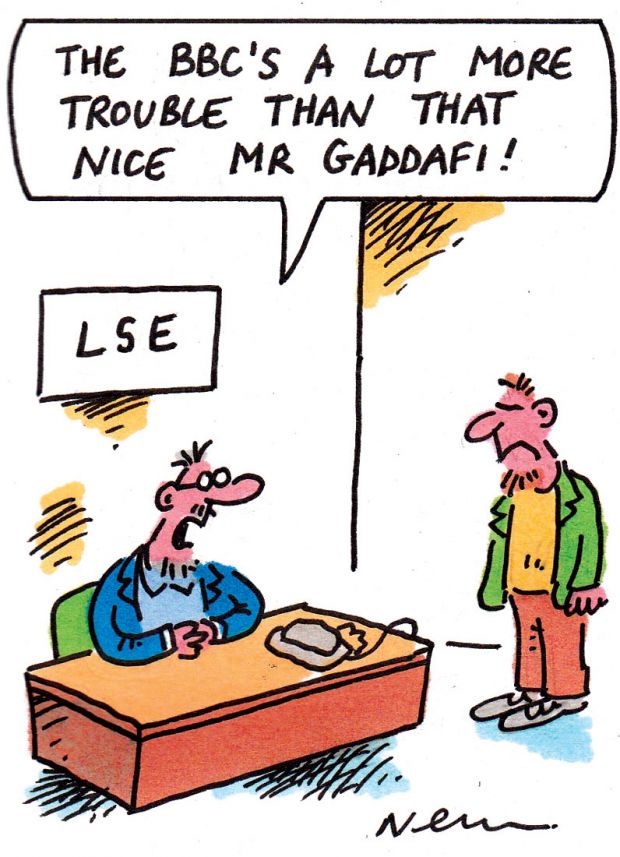
- The London School of Economics and the BBC have locked horns once again after former English Defence League leader Tommy Robinson turned up unannounced at a lecture with a cameraman making a documentary for the corporation, The Independent reported on 28 October. Mr Robinson’s attendance at a lecture on human rights in the Muslim world was criticised by the director of the LSE’s human rights centre, Chetan Bhatt, who said it “risked causing public disruption around a highly controversial figure at an event aimed at opposing violence and extremism”. Permission to film was given on the understanding that it was for a documentary on Maajid Nawaz, head of the Quilliam Foundation, a counter-extremism thinktank, the LSE said. The LSE – which also criticised the BBC earlier this year for putting students in danger by filming undercover during a student trip to North Korea – was not always so squeamish about who attended or gave lectures. In May 2010, the son of the Libyan dictator Colonel Gaddafi, Saif, delivered the Ralph Miliband memorial lecture following a £1.5 million donation.
- Pole dancing fitness classes have been banned by Swansea University Students’ Union because the activity is “inextricably linked to the multi-million pound sex industry,” The Daily Telegraph reported on 23 October. In a letter to the pole fitness club, the union said the classes were linked to the rise of “Raunch Culture” in society and the “objectification of women and girls”, who had been “deceived into thinking this is a way of taking charge of their sexuality”. However, Bethan Morris, president of the university’s pole fitness society, said the ban and the link to the sex industry was “highly, highly offensive”. Seemingly mystified by any connection to the clothes-light version practised in strip clubs, she added: “Males and females come to class to keep fit and gain strength, flexibility and coordination.”
- A “university” apparently based in London awarded an MBA to a dog as part of a BBC Newsnight sting. Pete – a hound living at Battersea Dogs and Cats Home – picked up the qualification from the American University of London after reporters sent off a fake CV in his name. Despite failing to provide a picture of “Pete” or copies of his prior qualifications, AUOL informed him that his application had been successful and the degree would be presented once a £4,500 fee had been received. Hundreds of senior executives list AUOL qualifications on their CVs, Newsnight said on 23 October. AUOL, a distance learning specialist, said it was “not a bogus university”, but admitted that it did not hold any accreditation with US or UK bodies.
- Seldom does a higher education story make the front page of a Sunday tabloid, but it can happen, especially when it involves a “Strictly Come Dancing sexbomb”. So it was that The Sun on Sunday splashed on October with the revelation that BBC presenter Susanna Reid – one of the favourites for this year’s Strictly title – “shared a secret fling with a university politics lecturer”. The 42-year-old had a three-year romance with a tutor while studying at the University of Bristol, which is said to have “scandalised” the campus, according to a source cited by the newspaper. With no off-screen scandals to report this year, it seems the red-tops are having to dig up a 20-year-old university romance to keep their readers titillated.
- David Cameron has hit out at the “snobbery” directed at so-called “Mickey Mouse” degrees, The Daily Telegraph reported on 29 October. The Prime Minister said it has long been assumed that there is “something wrong” with courses in “music studies” and “golf course management”, despite their helping to “really benefit people” and get them well-paid jobs, the paper reported. Providing more information about how different types of graduates fared in the job market would “get rid of that snobbery”, Mr Cameron told an event in Oxfordshire celebrating apprenticeships. Might the PM’s vehement defence of non-traditional subjects relate to his rarely mentioned A level in art history, which some Eton contemporaries might suggest, no doubt unfairly, was a “soft” subject enabling him to gain the right grades for entry into Oxford?
Register to continue
Why register?
- Registration is free and only takes a moment
- Once registered, you can read 3 articles a month
- Sign up for our newsletter
Subscribe
Or subscribe for unlimited access to:
- Unlimited access to news, views, insights & reviews
- Digital editions
- Digital access to THE’s university and college rankings analysis
Already registered or a current subscriber? Login